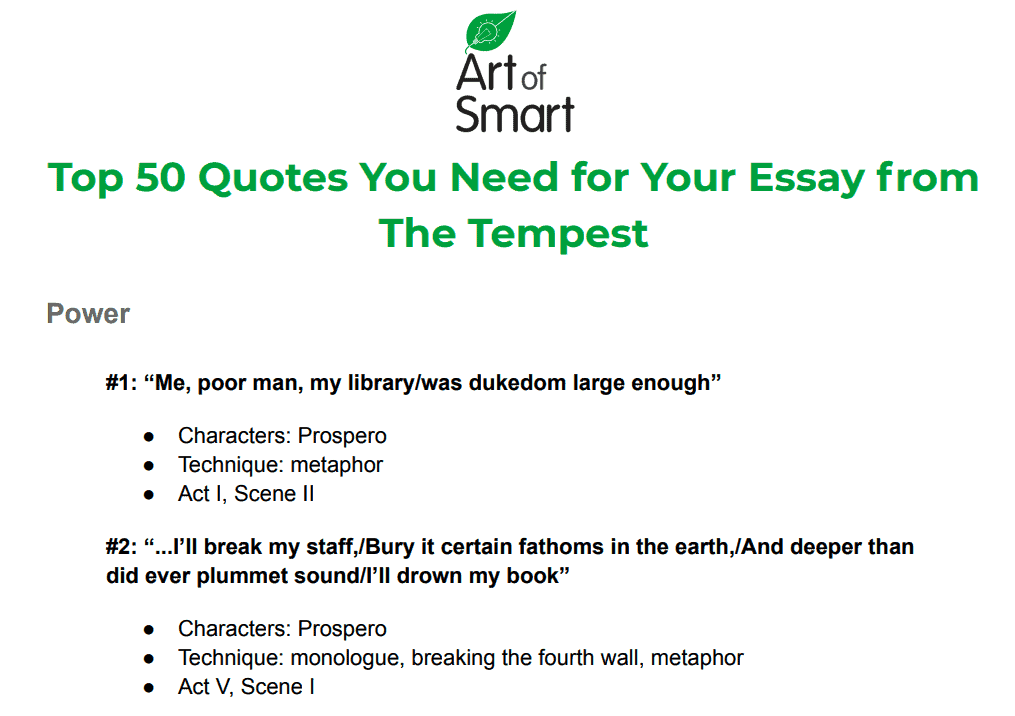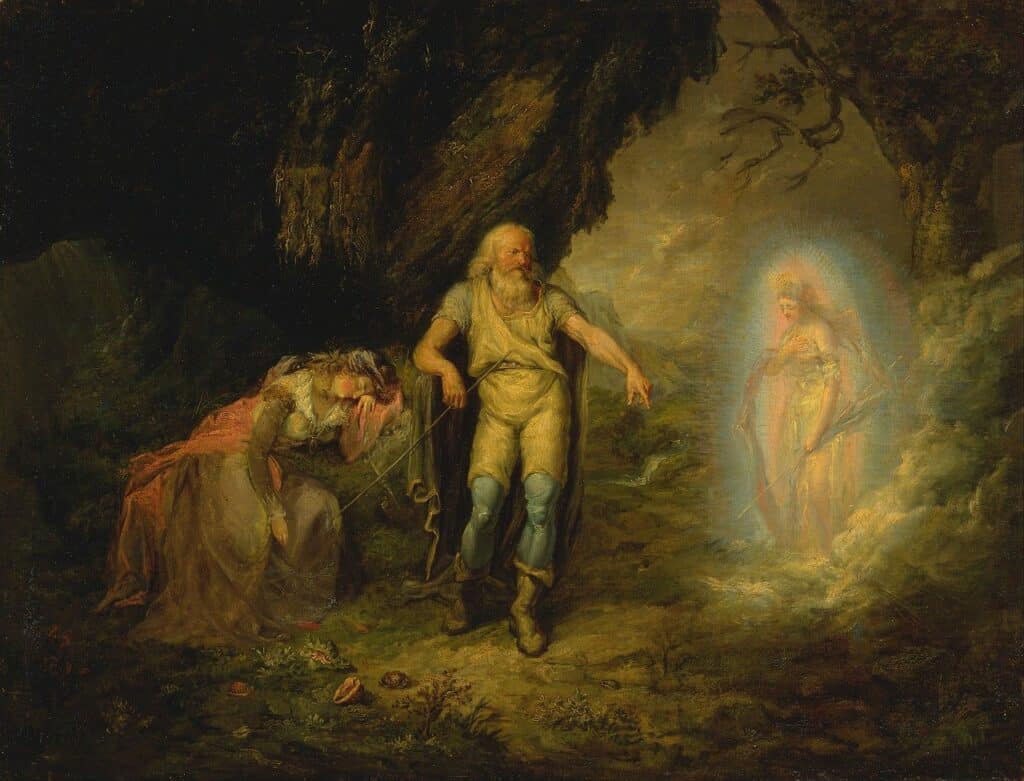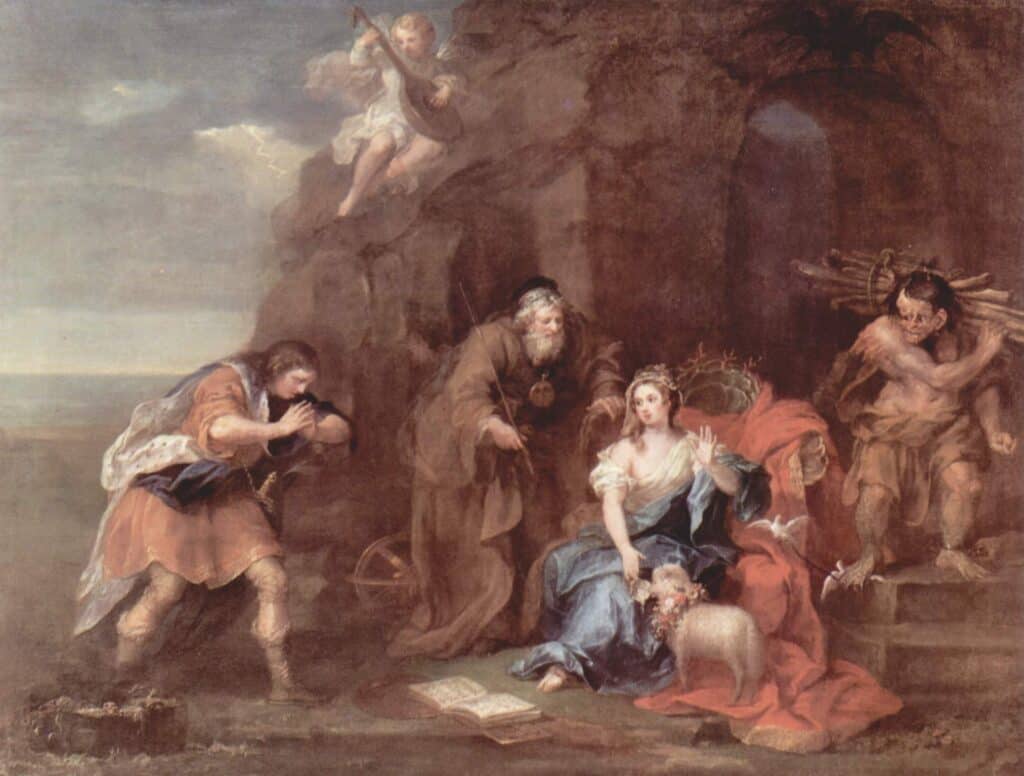Freaking out about the essay you have due on The Tempest because you’re struggling to find quotes and techniques? Perhaps you have found yourself wishing for Prospero’s powers to magic away the existence of your assignment…
Worry no more! We’ve compiled 50 quotes from The Tempest and we have broken these down into themes to help.
Check out our quotes and techniques from The Tempest now!
The Tempest Quotes about Power
Betrayal Quotes
Quotes about Revenge from Prospero from The Tempest
The Tempest Quotes about Colonialism
Family Quotes
Men VS Nature Quotes
The Green World Quotes
What is Caliban’s first line in the play?
What is the last line of The Tempest?
The Tempest Quotes about Power
#1: “Me, poor man, my library/was dukedom large enough”
- Characters: Prospero
- Technique: metaphor
- Act I, Scene II
#2: “…I’ll break my staff,/Bury it certain fathoms in the earth,/And deeper than did ever plummet sound/I’ll drown my book”
- Characters: Prospero
- Technique: monologue, breaking the fourth wall, metaphor
- Act V, Scene I
#3: “What I shall die to want…/And all the more it seeks to hide itself/The bigger bulk it shows. Hence, bashful cunning,/And prompt me, plain and holy innocence”
- Characters: Miranda
- Technique: plosives, allegory
- Act III, Scene I
#4: “I will rend an oak/And peg thee in his knotty entrials till/Thou hast howled away twelve winters”
- Characters: Prospero, to Ariel
- Technique: vivid imagery and description, enjambment
- Act I, Scene II
#5: “I prithee/Remember I have done thee worthy service,/Told thee no lies, made thee no mistakings, served/Without grudge or grumblings”
- Characters: Ariel, to Prospero
- Technique: repetition, alliteration, blank prose
- Act I, Scene II
#6: “Were I in/England now…/There would this monster make a man”
- Characters: Trinculo, about Caliban
- Technique: consonance, alliteration
- Act II, Scene II
#7: “You cram these words into mine ears against/The stomach of my sense”
- Characters: Alonso
- Technique: sibilance, metaphor, blank verse
- Act II, Scene I
#8: “That’s a brave god, and bears celestial liquor. I will/ kneel to him”
- Characters: Caliban, about Stephano
- Technique: prose, breaking the fourth wall
- Act II Scene II
#9: “Having first seized his books, or with a log/Batter his skull… Remember/First to possess his books, for without them”
- Characters: Caliban, about Prospero
- Technique: blank verse, monologue, vivid imagery
- Act II, Scene II
#10: “Thou shalt be pinched/As thick as honeycomb, each pinch more stinging/Than bees that made ‘em”
- Characters: Prospero, to Caliban
- Technique: blank verse, imagery
- Act I, Scene II
#11: “My high charms work,/And these, mine enemies, are all knit up/…They are now in my power”
- Characters: Prospero
- Technique: monosyllabic, aside
- Act III, Scene III
#12: “All hail, great master!…I come/ To answer thy best pleasure, be ‘t to fly,/To swim, to dive into the fire…/…task/Ariel and all his quality”
- Characters: Ariel
- Technique: flattery, blank verse
- Act I, Scene II
#13: “Your charm so strongly works ‘em,/ That, if you now beheld them, your affections/Would become tender”
- Characters: Ariel, to Prospero
- Technique: monologue, repetition of “you”
- Act V, Scene I
#14: Thou shalt be as free/As mountain winds: but then exactly do/All points of my command”
- Characters: Prospero, to Ariel
- Technique: simile, enjambment
- Act I, Scene II
Quotes from the Tempest about Betrayal from The Tempest
#15: “Full fathom five thy father lies”
- Characters: Ariel
- Technique: fricative, rhyme
- Act I, Scene II
#16: “Their manners are more gentle, kind, than of our generation you shall find”
- Characters: Gonzalo
- Technique: blank verse
- Act III, Scene III
#17: “As I told thee before, I am subject to a tyrant, a sorcerer that by his cunning hat cheated me of the island”
- Characters: Caliban
- Technique: prose, synecdoche
- Act III, Scene II
#18: “There be some sports are painful, and their labour/ Delight in them sets off…/The mistress which I serve quickens what’s dead/And makes my labours pleasures”
- Characters: Ferdinand
- Technique: monologue, blank verse
- Act III, Scene I
#19: “My strong imagination sees a crown/Dropping upon thy head”
- Characters: Antonio, to Sebastian
- Technique: allegory, plosives
- Act II, Scene I
#20: “Sweet lord, you play me false”
- Characters: Miranda, to Ferdinand
- Technique: symbolism, allegory for regicide,
- Act V, Scene I
#21: “Look, he’s winding the watch of his wit, by and by it will strike”
- Characters: Sebastian
- Technique: repetition, alliteration
- Act II, Scene I
Quotes about Revenge from Prospero from The Tempest
#22: “At this hour/Lie at my mercy all mine enemies”
- Characters: Prospero
- Technique: alliteration
- Act IV, Scene I
#23: “The rarer action is/In virtue than in vengeance”
- Characters: Prospero
- Technique: alliteration, anaphora, internal rhyme, epiphany
- Act V, Scene
#24: “Most wicked sir, whom to call a brother/would even infect my mouth, I do forgive/ Thy rankest fault”
- Characters: Prospero, to Antonio
- Technique: trochaic verse
- Act V, Scene I
#25: “Tell your piteous heart/There’s no harm done”
- Characters: Prospero, to Miranda
- Technique: monosyllabic, iambic meter, irony
- Act I, Scene II
The Tempest Quotes about Colonialism
#26: “A thing most brutish, I endowed thy purposes/With words that made them known”
- Characters: Miranda, to Caliban
- Technique: Irony, juxtaposition
- Act I, Scene II
#27: “Let me remember thee what thou hast promised,/Which is not yet performed me”
- Characters: Ariel, to Prospero
- Technique: Blank verse
- Act I, Scene II
Caliban Quotes about Colonialism from The Tempest
#28: “You taught me language, and my profit on’t/ Is, I know how to curse”
- Characters: Caliban
- Technique: prose, rhyme
- Act I, Scene II
#29: “Why what a fool was I to this drunken monster for a God”
- Characters: Caliban, about Trinculo and Stephano
- Technique: oxymoron, irony
- Act V, Scene I\
#30: “Thou poisonous slave, got by the devil himself/Upon thy wicked dam”
- Characters: Prospero, to Caliban
- Technique: blank verse
- Act I, Scene II
#31: “The clouds methought would open and show riches/ Ready to drop upon me, that when I waked/ I cried to dream again”
- Characters: Caliban
- Technique: Blank verse, metaphor, imagery, The Green World
- Act III, Scene II
The Tempest Quotes about Family
#32: “Misery acquaints a man with strange bed fellows”
- Characters: Trinculo
- Technique: internal rhyme
- Act II, Scene I
#33: “Good wombs have borne bad sons”
- Characters: Miranda, to Prospero
- Technique: irony, juxtaposition, plosives
- Act I, Scene II
#34: “I am your wife if you will marry me./If not, I’ll die your maid.”
- Characters: Miranda, to Ferdinand
- Technique: repetition, prose
- Act III, Scene I
#35: “The jewel in my dower, I would not wish/Any companion in the world but you,/Nor can imagination form a shape/Besides yourself to like of”
- Characters: Miranda
- Technique: Metaphor, blank verse
- Act III, Scene I
#36: “All thy vexations/Were but trials of thy love, and thou/Hast strangely stood the test”
- Characters: Prospero, to Ferdinand
- Technique: blank verse
- Act IV, Scene I
#37: “Do not smile a me that I boast of her/For though shalt find she will outstrip all praise/And make it halt behind her”
- Characters: Prospero, to Ferdinand
- Technique: monologue
- Act IV, Scene II
#38: “Look down, you gods,/And on this couple drop a blessed crown”
- Characters: Gonzalo
- Technique: Biblical reference, Divine Right of Kings
- Act V, Scene I
#39: “Awake, dear heart, awake. Thou hast slept well. Awake”
- Characters: Prospero
- Technique: repetition, personification
- Act I, Scene II
The Tempest Quotes about Men VS Nature
#40: “How many goodly creatures are there here!/How beauteous mankind is!”
- Characters: Miranda
- Technique: exclamatory
- Act V, Scene I
#41: “This thing of darkness I acknowledge mine”
- Characters: Prospero
- Technique: blank prose, Caliban referred to as a ‘thing’
- Act V, Scene I
#42: “I might call him. A thing divine, for nothing natural. I ever saw so noble”
- Characters: Miranda
- Technique: contrast, ‘thing’ is seen as a blessing
- Act I, Scene II
#43: “Thou most lying slave,/Whom stripes may move, not kindness!”
- Characters: Prospero
- Technique: monosyllabic, prosaic verse
- Act I, Scene II
#44: “He’ll be hanged yet, though every drop of water swear against it and gape at widest to glut him”
- Characters: Gonzalo
- Technique: nature as a threatening force, The Green World
- Act I, Scene I
#45: “Whom thus we stray to find, and the sea mocks/Our frustrate search on land”
- Characters: Alonso
- Technique: fricatives
- Act III, Scene III
#46: “As wicked dew as e’er my mother brushed/…/Drop on you both!…/And blister you all o’er”
- Characters: Caliban, to Prospero and Miranda
- Technique: Blank verse
- Act I, Scene II
Quotes from The Tempest about The Green World
#47: “Hell is empty and all the devils are here”
- Characters: Ariel
- Technique: Biblical allusion, exaggeration, irony
- Act I, Scene II
#48: “We are such stuff as dreams are made on, and our little life is rounded with a sleep”
- Characters: Prospero
- Technique: Soliloquy
- Act IV, Scene I
#49: “Your tale, sir, would cure deafness”
- Characters: Miranda, to Prospero
- Technique: exaggeration
- Act I, Scene II
#50: “Be not afeared. The isle is full of noises,/Sounds, and sweet airs, that give delight and hurt not”
- Characters: Caliban
- Technique: Blank Verse
- Act III, Scene II
#51 (bonus!): “These our actors/As I foretold you, were all spirits, and/Are melted into air, into thin air”
- Characters: Prospero
- Technique: Repetition, soliloquy, meta-theatre
- Act IV, Scene I
What is Caliban’s first line in the play?
“As wicked dew as e’er my mother brushed
With raven’s feature from unwholesome fen
Drop on you both! A southwest blow on ye
And blister you all o’er!”
- Act I, Scene II
What is the last line of The Tempest?
“Mercy itself, and frees all faults.
As you from crimes would pardoned be,
Let your indulgence set me free.”
- Act V, Epilogue
On the hunt for quotes from other texts aside from The Tempest?
Check out our list of quotes for the following texts:
- Frankenstein
- Lord of the Flies
- Blade Runner
- Pride and Prejudice
- To Kill a Mockingbird
- Never Let Me Go
- One Flew Over the Cuckoo’s Nest
- Things Fall Apart
- Jasper Jones
- The Great Gatsby
We’ve also got articles specifically on plays by Shakespeare which you can check out below:
Are you looking for some extra help with your analysis of quotes from The Tempest?
We have an incredible team of tutors and mentors!
We can help you master your analysis of quotes from The Tempest by taking you through the summary, context, key characters and themes. We’ll also help you ace your upcoming English assessments with personalised lessons conducted one-on-one in your home or online!
We’ve supported over 8,000 students over the last 11 years, and on average our students score mark improvements of over 20%!
To find out more and get started with an inspirational tutor and mentor, get in touch today or give us a ring on 1300 267 888!
Tiffany Fong is currently completing a double degree in Media and Communications with Law at Macquarie University. She currently contributes to the university zine, Grapeshot where she enjoys writing feature articles, commentary on current affairs or whatever weird interest that has taken over her mind during that month. During her spare time, Tiffany enjoys reading, writing, taking care of her plants or cuddling with her two dogs.










